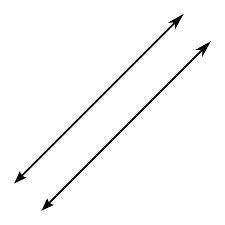parallel
英 [ˈpær.ə.lel]
美 [ˈper.ə.lel]
- n. 平行线;对比
- vt. 使…与…平行
- adj. 平行的;类似的,相同的
使用频率:

记忆方法
1、par- / para- "beside" + allel-.
2、字面意思就是:beside one another.
2、字面意思就是:beside one another.
中文词源
parallel 平行的,并列的
来自希腊语parallelos,并列,平行,para-,在旁,在周围,-allel,改变,另外的,词源同else,alternate.即在旁边的另外一条,引申词义平行的,并列的。
英语词源
- parallel
-
parallel: [16] Etymologically, parallel simply means ‘beside each other’. It comes via French parallèle and Latin parallēlus from Greek parállēlos. This was a compound formed from pará ‘beside’ and allélōn ‘each other’, a derivative of állos ‘other’ (to which English else is distantly related).
=> else - parallel (adj.)
- 1540s, from Middle French parallèle (16c.) and directly from Latin parallelus, from Greek parallelos "parallel," from para allelois "beside one another," from para- "beside" (see para- (1)) + allelois "each other," from allos "other" (see alias (adv.)). As a noun from 1550s. Parallel bars as gymnastics apparatus are recorded from 1868.
- parallel (v.)
- 1590s, from parallel (n.).
权威例句
- 1. Parallel lines will never meet no matter how far extended.
- 无论延伸多长,平行线永不相交。
- 2. Farthing Lane's just above the High Street and parallel with it.
- 法辛巷刚好在大街的北面,与大街平行。
- 3. Do the emotions develop in parallel with the intellect?
- 情感与智力是并行发展的吗?
- 4. This is a real world, running parallel to our own.
- 这是个真实的世界,与我们的世界并存。
- 5. It's an ecological disaster with no parallel anywhere else in the world.
- 这是一场在世界其他地方都没有出现过的生态灾难。
